They were told to stay away, but crowds paying tribute to Duke of Edinburgh had other ideas
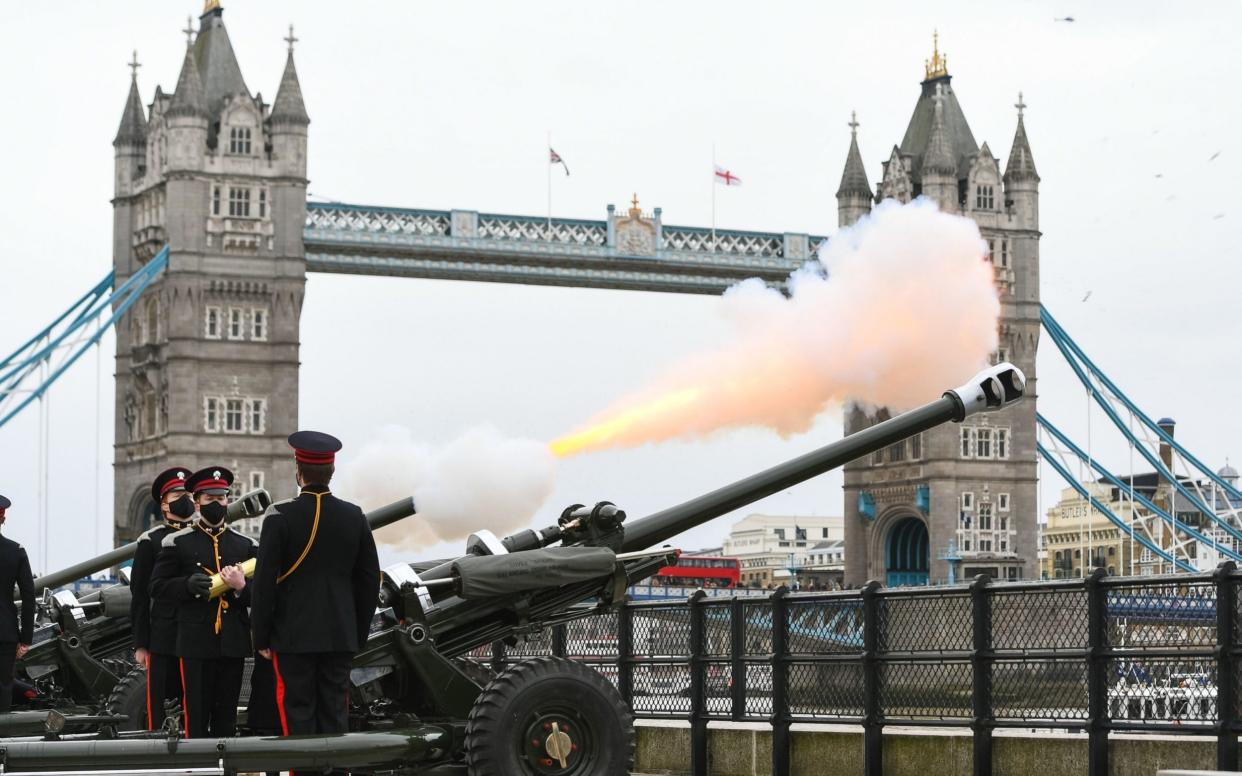
- Oops!Something went wrong.Please try again later.
They came to mourn his death and celebrate his life. At Buckingham Palace, at Windsor Castle and at Sandringham, wellwishers ignored the “stay away” warnings to pay their respects. The day after the Duke of Edinburgh’s death, Britain woke up to realise that the man who had been an ever-present fixture, a steadying hand across the decades, was no longer with us.
In the first full day of mourning, the military paid its tribute with a Death Gun Salute at midday, 41 rounds fired at one round a minute for 40 minutes at locations including London, Edinburgh, Belfast and Cardiff as well as the overseas territory of Gibraltar. At sea, guns were fired from Royal Navy warships saluting “one of their own”.
At Woolwich Barracks, 10 miles from Buckingham Palace, the King’s Troop Royal Horse Artillery, the troop closest to the royal household, rode out onto the Parade Ground, a procession of 71 horses, 36 of them pulling six 13-pounder field guns dating from the First World War. The same guns had been fired in celebration at the Duke’s wedding to Princess Elizabeth in 1947 and again less than six years later at her coronation. Now here they were marking Prince Philip’s passing. Queen Victoria in 1901 and Winston Churchill in 1965 had been given similar death gun salutes.
Onlookers at Woolwich gathered at the railings, peering through, watching the smoke billowing from the guns with each shot fired, drifting upwards into a grey – and suitably funereal – sky. A small crowd lined Tower Bridge to watch the gun salute taking place at the Tower of London below.
This was a sombre occasion and the firing of the guns, one round every minute and nothing hurried, reflected that. In normal times, the guns would have been fired from Hyde Park and the crowds would have been huge. But these are not normal times.
For millions of people watching on television – told to stay at home – there was time to pause and process the death of a man who for more than 70 years had been the Queen’s consort.
Church bells were encouraged to ring out too at midday; a single strike or muffled tolling but repeated 99 times for every year of the Duke’s life. An estimated 5,000 churches took part on Saturday. On Friday night, the bells at Westminster Abbey, where the Duke had married his princess, had done the same. The Abbey had placed a photograph of the Duke, in military regalia, alongside the nave, flanked by a burning candle and a vase of tulips. It was a simple but moving tribute.
Life, or a version of public life, has come to a standstill. Campaigning for local elections has been suspended and at the Grand National at Aintree racecourse, a two-minute’s silence was observed before the start of the world’s most famous steeplechase. At football matches, players wore black armbands and observed a two-minute silence as well. On the London Underground and at rail stations, electronic advertising had been switched to show images of the Duke, instead of the usual goods and services aimed at travellers.
Officially, no one was meant to be at Buckingham Palace on Saturday. “You are kindly requested not to leave tributes, artefacts or candles at this location,” read the signs outside the palace. But that wasn’t going to happen. By midday, the gates to Buckingham Palace were lined with flowers that went three bouquets deep, staff regularly removing them to take inside. In a pandemic, this was not the time to allow crowds to gather and linger.
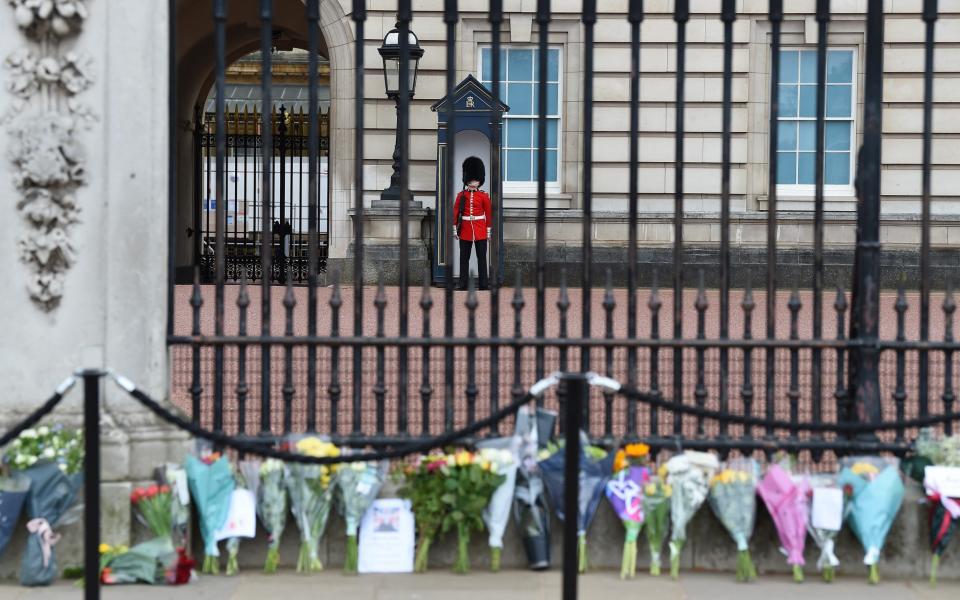
But gather they did. The royal household had erected barriers overnight, a velvet rope and a one-way system to allow people to pay their respects in a Covid-compliant manner.
By the early afternoon, a long queue had formed, maybe as much as half a mile, snaking along the front of the palace gates along Green Park and towards Hyde Park Corner. The day before, The Mall, the road running up to the palace, had been filled with black cabs lining the route. Prince Philip famously used to drive one about town as his private car.
Shirley Singleton, 81, admitted she had been “crying a lot” since hearing the news of the Duke’s death. She had caught the bus from her home in west London to pay her respects at the palace gates. His passing had sparked memories of living – and surviving – through the Second World War. “I was a few years old when I was going into the air raid shelters”, she said. “I’m just very grateful he was part of my era and my life.”
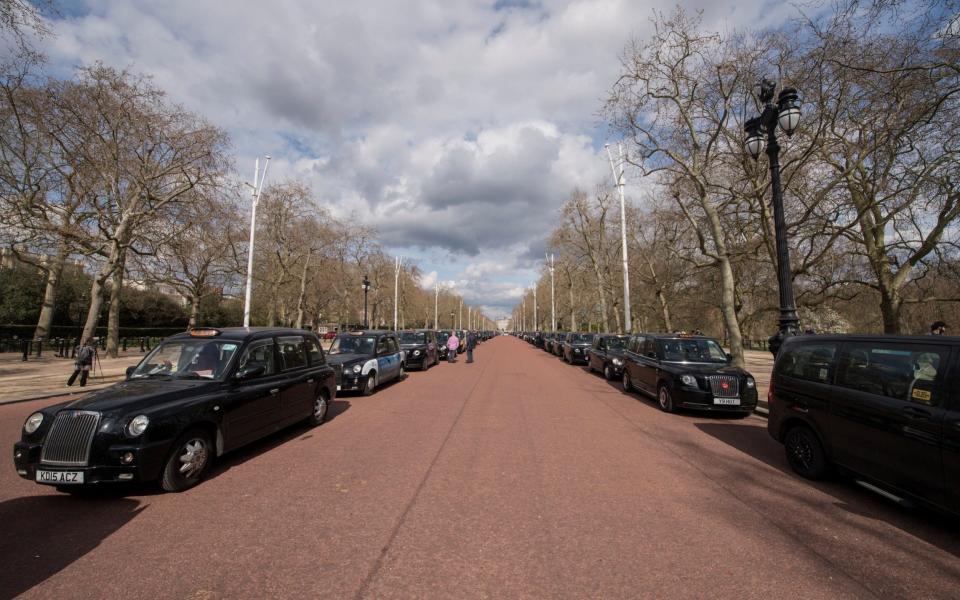
“The Duke of Edinburgh was a brave man who fought in the war. We didn’t have much then but we shared it together with our rations – it reminds me of living through the pandemic. For the Queen, I’m glad she had time with him during the pandemic when the visits were cut down,” she added.
Two generations younger, Serena Gupta, a 20-year-old student, had been moved to make the pilgrimage after undertaking and succeeding in her Duke of Edinburgh award. Ms Gupta, from Bromley in south east London, displayed three badges proudly pinned to her lapel: her gold, silver and bronze Duke of Edinburgh awards.
Completing the award had shaped her life and interests, she explained as she laid flowers at the gates. “When I did the Duke of Edinburgh award I took part in a year of volunteering in conservation – it made me really love it. I still volunteer now for English Heritage,” she said.
Ms Gupta, an undergraduate at the University of Warwick studying history of art, came to Buckingham Palace to collect her gold award and had hoped to meet the Duke. Unfortunately, by that point he was retired, so instead she collected it from his son, Prince Edward.
“I’ve been reading that Prince Philip was the only one who could act normally around the Queen and that makes me really sad that he’s gone.”
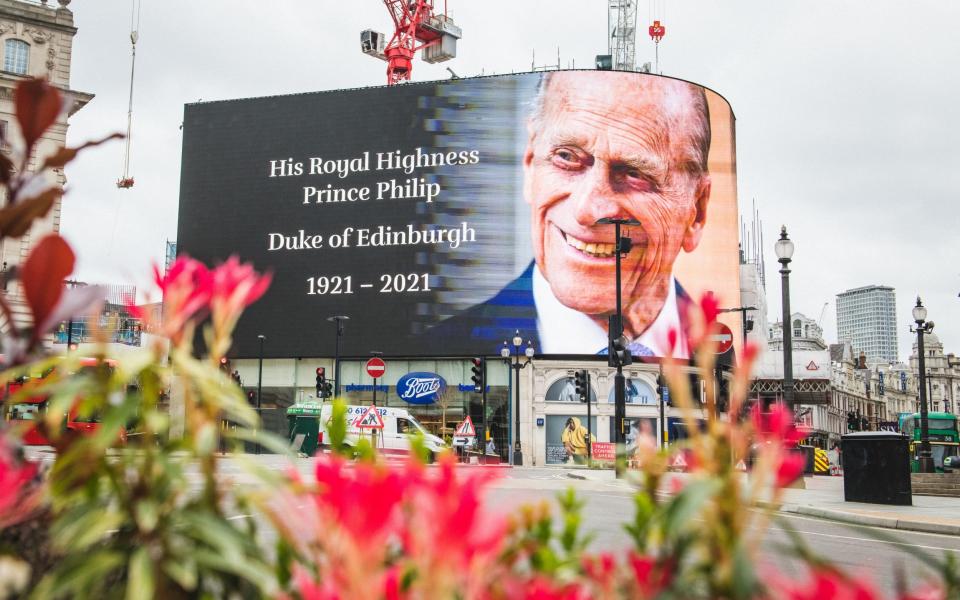
Wellwishers had come in the night to pay respects, including a father and two young children. “We wanted to try and avoid the crowds,” Alex, the father, told the BBC. “We thought we should come down in the night and spend time in front of the palace.”
At Windsor Castle, where the Duke had died on Friday morning and where the Queen resides in mourning, crowds came to the gates to say their farewells. The wall of flowers had built up lining the castle entrance. Thousands of people had come during the day, a steady flow, despite the Covid restrictions and similar warnings to keep clear of the area.
Bee Lokkit, 27, a sociology student from Barnsley, South Yorkshire, had woken at 4am on Saturday and jumped on the first train down south to lay flowers by 8.30am. He wore a suit and black tie. "Running the Royal family in the UK is not an easy task,” said Mr Lokkit. “He is such an amazing person. We should all be inspired by him and approach life with the same sort of energy he had."
A local doctor at nearby Wexham Park hospital, Qusai Arsiwala, 37, had visited with his wife and two young daughters, aged six and four, to thank the Duke for his “sacrifice”. Mr Arsiwala, from Iver in Buckinghamshire, said: "For us Prince Philip and the Queen represent sacrifice, duty and, most of all, a level of respect. It's really important for our children to understand that this man gave a huge amount to the public and served the public."
Deborah West, an NHS business manager from Great Missenden in Buckinghamshire, fought back tears as she paid her tribute at Windsor Castle. "I am of the generation who grew up in the 70s, 80s and 90s with the Royal family,” said Mrs West, 58. “It is nice to be here with people to pay my respects. The Duke took the trouble to talk to people. Nobody was left out of the experience and he did that really naturally. This is the measure of the man."
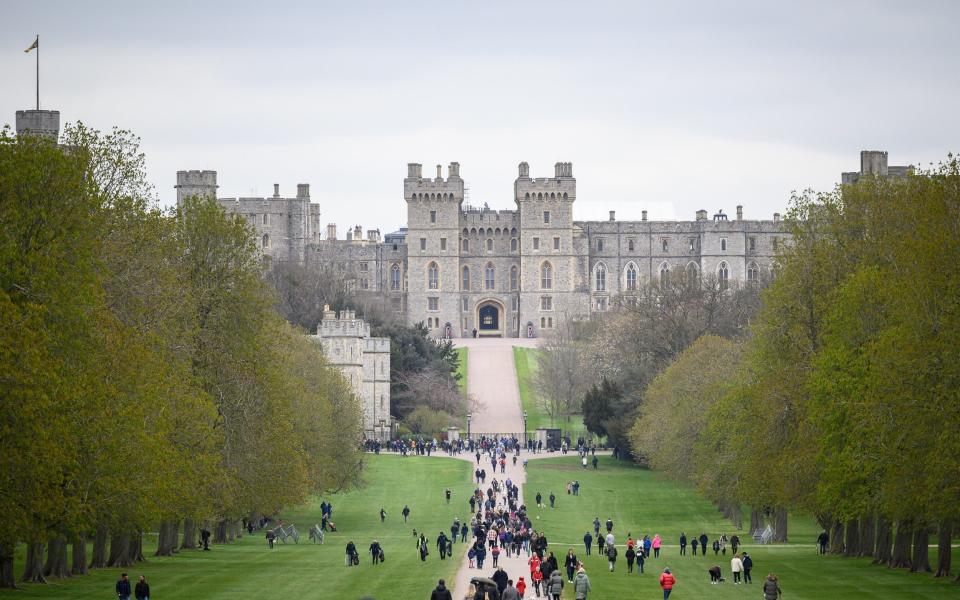
Local shops and pubs, despite being shut during the pandemic, had begun marking their own tributes in windows. The Two Brewers pub, around the corner from Windsor Castle, displayed a variety of photographs of Prince Philip in its windows captioned simply: “In Memory of Prince Philip, Duke of Edinburgh 1921-2021”.
At the Duke of Edinburgh pub in Winkfield in Windsor, Annie Andrews, the landlady, had gone in desperate search of bunting to mark his death. The pub will reopen to customers on Monday. "We will be doing toasts to him in the garden and things like that but we have to try and keep the space between people," said Ms Andrews. "I'm a Windsor girl, born and bred, and the Royal family has always been very important to me and we always do things to mark the events in the monarchy's history."
At Hillsborough Castle in Belfast, Naomi Armstrong-Cotter had brought her two daughters, Lilly, aged six and Essie, five, to lay flowers at its gates. It was a day, she said, they would all remember “in a time we can’t do what we’d usually do and for the girls to understand the importance of the great loss to our nation. He [the Duke] was immeasurable, a man of dignity, of honour, a man of service and the support he gave to our Queen is incredible. We’re sad because the Queen has lost her best friend and he deserves to be memorialised in the best way that we can."
They were sentiments echoed up and down the country. From those who had ventured out and from those who had spent the day in quiet reflection, perhaps watching events on television.
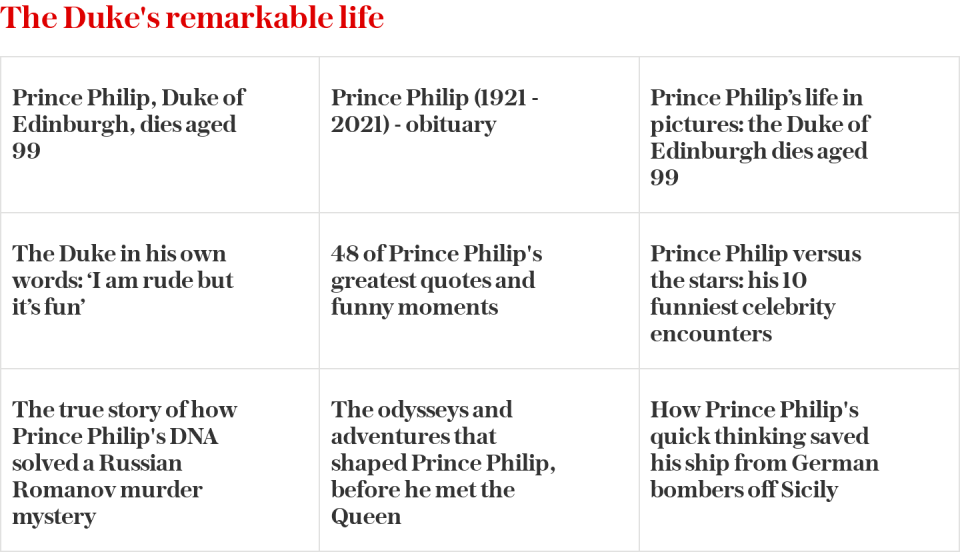
Warrant Officer 1st Class Glynn Moffat, commanding the Gun Salute at Her Majesty’s Naval Base in Portsmouth, understood the huge occasion, the event in which he had played an instrumental part. “For the team, we are doing our duty, something we train and practice for. It's always afterwards that you reflect on what you have done and what you have been a part of," he said.
The public will likely spend this week coming to terms with the fact the Duke of Edinburgh will no longer be a part of the nation’s fabric. He has gone but Saturday’s events showed he will never be forgotten.

